News
Verdict of accidental death recorded following tragic telehandler accident
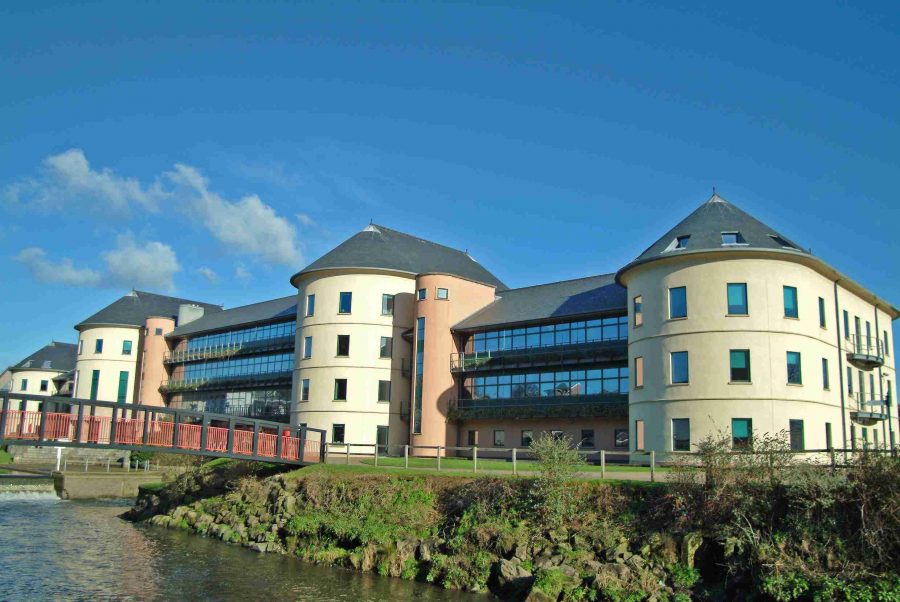
JONATHAN HUW HOWELLS was a man who took great pride in his work.
His machinery was immaculately maintained, and he always carried out his mechanical and agricultural duties to a high standard.
But on the afternoon of November 8, 2020, Mr Howells touched a control on his Merlo Telehandler causing the boom to rise towards an 11,000-volt electric cable. Even though the boom didn’t touch the cable, its tremendous voltage caused an arcing effect which electrocuted Mr Howells to death. The intensity of the charge blackened the step leading up to the Merlo, which was where Mr Howells had been standing, together with another piece of ground alongside the vehicle; both the front and back wheels of the Marlo had caught fire.
This week a jury inquest at County Hall, Haverfordwest, recorded a verdict of accidental death after considering the tragic circumstances.
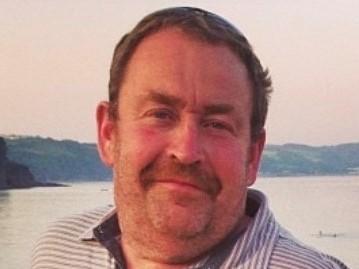
“Everyone was proud of the work that Huw did and the care that he took,” his wife, Catherine Howells, told this week’s inquest at Pembrokeshire Coroners Court. “Two days earlier he’d been trimming some trees and had worked closely with Western Power Distribution concerning the electric cables overhead. This was not something he took lightly. I can’t understand why this has happened.”
A family friend, Emrys Davies, had asked Mr Howells to trim some trees on his farm at Dan y Coed, Llawhaden, as he wanted to install a care-line telephone. Mr Howells left his home at Gellyrenwyn, Gilfach Hill, Lampeter Velfrey, at around 9.30am and spent the day cutting back branches assisted by another close friend, Brian Twoose, a mechanic, Brian’s wife, Linda, and her sister.
At around 4.20 pm they finished their work, however Mr Davies mentioned that some more trees on his farmyard needed trimming. Mr Howells positioned his Merlo near to the trees and extended the boom to within two feet of the 11,000-volt cable.
But in his statement to the inquest, Health and Safety electricity expert Mr Stephen Reeves said this was dangerously close. “It’s likely that anyone who comes into close proximity to a cable with that magnitude of voltage would be electrocuted.”
He went on to say that Western Power Distribution guidelines advise people to carry out work within a three-metre exclusion zone from 11,000-volt cables such as the one at Dan y Coed. To draw a comparison, Mr Reeves said the voltage in commercial and domestic buildings is a mere 230 volts.
“Western Power guidance doesn’t seem to have been followed in this very tragic case,” he concluded.
Meanwhile, in his written statement to the inquest, Mr Twose said that Mr Howells was happy with the height of the boom. “We were watching, to make sure it wasn’t touching and when it was about two feet from the cables, we all agreed not to go any higher.”
After stepping down to check whether it would be possible to cut the branches, Mr Twose saw Mr Howells return to the Telehandler “He looked into the cab from outside and reached in. I don’t know what he did, but the boom moved upwards towards
the power line. I screamed at him to stop but by now he was standing completely still, holding onto the machine bolt upright.”
Eventually Mr Howells was seen to loosen his grip and collapse to the ground. A postmortem confirmed that he had died from cardiac arrest and electrocution.
After considering the evidence, Acting Senior Coroner Mr Paul Bennett said that given Mr Howells’ long-standing experience in operating equipment such as the Merlo and in cutting down branches, he would have been aware of Western Powers’ guidelines. “It’s highly likely that he had used the guidance in the past but on this particular occasion, it might well have been a lapse of concentration where he forgot about where he was in relation to the boom. Something occurred which caused the electric to come within that exclusion area.”
Why The Herald covers inquests
We understand that the death of a loved-one is an incredibly painful time for their friends and relatives. As journalists, we have all suffered loss and the grief that goes with it so we can understand how traumatic it can be if that death is unexpected. Covering inquests is not a job any journalist relishes. But it is a vital part of our job and one that can uncover wrongdoing, can expose flaws in systems and can ultimately help families discover the reasons behind the death of their loved-ones.
What are inquests and why are they held?
An inquest is a formal investigation overseen by a coroner to establish how someone died. Inquests are held where a death was sudden and the cause is unknown, where someone has died an unnatural or violent death, or where someone has died in a place or circumstance where there is legal requirement to hold an inquest, for example in prison custody or while sectioned under the Mental Health Act.
The purpose of an inquest is to find out the identity of the deceased as well as where, when and how they died. It does not apportion blame.
Why do journalists go to inquests?
Anyone can attend an inquest. Since the start of the pandemic, some inquests are available on videolink so you may not have to attend in person and you may not notice that a journalist is attending via videolink. But all inquests are held in public and therefore all the information you hear at an inquest is already in the public domain.
We understand that there may be details heard at inquests that are very private, but nevertheless contributed to the reasons behind the death. We will do our very best to ensure that these details are reported sensitively and accurately.
Deaths affect communities as well as families and their repercussions can often be wide.
Why is coverage important?
It is in the public interest that people are able to hear the circumstances behind any untimely death because there may have been unfair or inaccurate rumours in the community that can be cleared up by accurate and concise coverage of the inquest.
There are many lessons that can be learned from inquests. Drawing the attention of the public to the circumstances surrounding someone’s death could be key to preventing similar deaths in the future. Explaining how drug or alcohol abuse led to someone’s death may encourage others to seek help for addiction. Showing how the high speed of a driver caused a fatal crash may act as a warning for those who drive too quickly. Reporting on the details what happened before a person took their own life may raise warning flags for the loved-ones of others who may be considering the same.
There is a real chance that coverage of inquests can prevent similar deaths in the future.
Coverage of inquests can often provide a platform for families to campaign about issues they’ve encountered or can provide relief that wrongdoing has been publicly exposed.
Because inquests are held in open court, they are subject to the principles of open justice and transparency which are a cornerstone of our justice system. Because the judgements of a coroner are not usually widely available elsewhere, newspaper reports may be the only comprehensive, publicly accessible record of the proceedings.
Why didn’t you tell me there was going to be a story online?
Before any inquest a coroner’s officer should always tell families that the media will be present at an inquest. You should always assume that an inquest is going to be covered by the press or wider media and that coverage will be online a short time after the verdict.
We know that the facts outlined at inquests can often be stark or upsetting and that the details sometimes do not represent the essence of a person or the many great things they did in their lives.
We are always keen to speak to relatives so that they can add tributes, or can tell us why their loved-one was so special to them. We are always happy to include extra detail in our reports to ensure that we do justice to their memory.
You can always email or call us us with anything you want us to add, or even contact us ahead of an inquest.
If you do not want to speak to us, then we will respect that. We will not approach you again if you tell us, you do not want to speak to us.
Unfortunately, we will not remove reports of inquests from our website but we are always happy to correct genuine typographical errors.
We do our best to delete any inappropriate comments on our own Facebook page but if you spot any that we have missed under the report of an inquest then please get in touch with us.
What are the journalistic guidelines around covering inquests?
As professional journalists we do not include all the evidence heard at an inquests and we do make editorial judgements in order to summarise the evidence heard.
But we won’t ever publish sensationalist coverage and we will always do our best to be as sensitive as we can, while reporting the facts to maintain the principle of open justice.
There are specific guidelines around the reporting of suicides which mean that journalists cannot provide excessive detail around the method of suicide. You can find details here.
The Independent Press Standards Organisation (IPSO) provides best-practice guidance to journalists around the coverage of inquests. This leaflet explains more about these guidelines.
Business
Welsh producers to showcase at UK’s leading food and drink show

WALES’ finest food and drink companies are gearing up to showcase their innovative spirit and exceptional quality produce at a pivotal show in the UK food and drink calendar.
The group includes 44 Welsh food and drink companies who will be attending the Farm Shop & Deli Show 2024 being held at the NEC in Birmingham between 29 April – 1 May. This event will serve as a prime opportunity for both established companies and emerging stars from Wales to exhibit their products to a national audience.
Supported by the Welsh Government, 13 of Wales’ well-known food and drink companies will be exhibiting on the Welsh Government Pavilion at the show. A further 20 Welsh up and coming and emerging stars will be exhibiting as part of the Cywain Showcase stand, while another 11 Welsh companies will be exhibiting for 1 day during the show on the Cywain Test Trading stand, these companies will change each day.

Welsh Government Cabinet Secretary for Climate Change and Rural Affairs, Huw Irranca-Davies MS, said, “The Farm Shop & Deli Show provides unparalleled opportunities for Welsh companies to showcase the exceptional quality and innovation of their products. These events are crucial for promoting Welsh products and reinforcing Wales’ reputation for quality and innovation in food and drink.
“The Welsh Government is dedicated to supporting our producers, ensuring they have the platforms needed to succeed and contribute to Wales’ reputation as a place of outstanding natural produce. We are committed to helping them thrive in these important markets and continue to build on Wales’ esteemed reputation.”
Welsh producers exhibiting as part of the Welsh Government Pavilion includes Calon Wen Organic Dairy, Cradoc’s Savoury Biscuits Ltd, Crwst Ltd, Golden Hooves, Hive Mind Mead & Brew Co, Mario’s Ice Cream, Morning Foods, Rural Foodies Ltd/Coco Pzazz, Snowdonia Cheese Company Ltd, The Anglesey Sea Salt Company/Halen Môn, Tregroes Waffles, Welsh Hills Bakery and Welsh Lady Preserves.

The 31 Welsh companies making up the showcase under the support of Cywain, a Welsh Government funded project that works with food and drink producers across Wales, helping them grow and develop their businesses, will feature products from alcohol, coffee, tea, chocolate, cheeses, rapeseed oil to preserves, sauces and spices.
Commenting on being part of the Welsh Government delegation, owner Alison Lea-Wilson from Anglesey sea salt company Halen Môn said, “We’ve attended Food & Drink Expo several times and always find it an interesting mix of people giving us a chance to stay updated on the food and drink industry. We’re looking forward to catching up with our current customers at the Farm Shop & Deli Show this year and are excited about the possibility of meeting new ones, particularly ingredient suppliers.
“It’s also our first time here as a B Corp business, which is a big step for us, and we’re launching our new Beetroot ketchup, adding a vibrant touch to our product line.”

Cradoc’s Savoury Biscuits Ltd is set to feature their new Gluten Free range at the Farm Shop & Deli Show, with products ready to order alongside their traditional offerings. The company is also proud finalists for the Artisan Food and Drink Business of the Year at the Wales Food and Drink Awards 2024.
Reflecting on a year of innovation and growth, Allie Thomas from Cradoc’s Savoury Biscuits said, “2023 was a pivotal year for Cradoc’s. We embarked on a journey of transformation, starting with a significant update to our packaging, which is our main sales tool and we invest as much as possible in protecting the authenticity of the Cradoc’s brand. Working with Zero2Five Food Industry Centre led to enhancements that resonate with our customers, emphasizing our Net Zero Carbon Manufacturing status and sustainability efforts.
“We have recently got the go ahead for our new gluten free bakery, which is testament to our commitment to inclusivity and innovation. We’re looking forward to seeing what visitors to these shows think of our new three gluten free flavoured crackers: Rosemary and Garlic, Chilli Ginger and Cumin and Cheddar Cheese and Chives.”
After a successful rebranding launch and a Farm Shop & Deli Gold Award win for their Traditional Mead at last year’s Farm Shop & Deli Show, Hive Mind Mead & Brew Co are set to showcase their modern mead to a wider audience at this year’s show.
“Our presence at the Farm Shop & Deli Show is testament to our growth and the significant demand for our products over the last 5 years, but in particular within the last 12 months which has seen us stocked in Selfridges and in 3 Michelin Restaurants” says Kit Newell, Co-founder of Hive Mind Mead & Brew Co.
“Our rebranding to Hive Mind Mead & Brew Co in 2023 was a milestone of our progress and our commitment to modernising mead. This year, we’re not just expecting to showcase our products to those unfamiliar with contemporary mead; we’re here to forge lasting connections with larger retailers and regional distributors, and to reaffirm our relationships with those who have supported us from the start. The Farm Shop & Deli Show is more than an event for us—it’s a platform to test the pulse of the market, to ensure our products resonate with current trends through direct consumer feedback.”
“Our achievements, such as winning the Golden Fork Award for Wales, are symbols of our dedication to quality and taste. Alongside our flagship wine-style meads and modern sparkling varieties we will have our special edition meads that celebrate and support bee charities such as Bees For Development, made using honey from forests in Zambia. Our Spiced Honey Rum, launched in February, is the newest addition to our family of products, and we’re excited to see it take its place in the spotlight.”
Also, within The Restaurant Show, there will be a Geographical Indication (GI presentation) and tasting taking place on the Restaurant Stage between 15:30 – 16:15 on Monday 29 April.
Farm Shop & Deli Show is packed with new launches, fresh industry insights and trend-setting food and drink to help you get face-to-face with the people driving the market forward in 2024.
Whether you’re an independent farm shop, delicatessen, or artisan food outlet, you can help grow your business along with your passion at Farm Shop & Deli Show. At the show you’ll find all the big ideas to help you discover fresh thinking and practical tips and techniques to increase your profits with our exciting line up of live events and sessions. The show will also reveal the winners of the Farm Shop & Deli Retailer Awards 2024.
Farm Shop & Deli Show will run alongside Food & Drink Expo, National Convenience Show, The Forecourt Show and The Restaurant Show in 2024 as part of the UK Food & Drink Shows, bringing together the grocery, specialist retail, wholesale, foodservice and hospitality sectors under one roof. With over 1200 exhibitors and 25000+ visitors to five shows over 3 days, the event is a must-visit for anyone in the food and drink industry.
Other Welsh companies participating independently at the other shows include Cygnet Distillery, Dewkes Ltd, Gasm Drinks, Heartsease Farm, Meadowvale Foods, Peter’s Food Ltd, Brain Blasterz and Celtic Frozen Drinks.
Come and visit the Welsh food and drink companies at the Farm Shop & Deli Show from the 29 April – 1 May:
- Welsh Government Pavilion | Hall 20 | Stands S160 & S170
- Cywain Showcase Stand | Hall 20 | Stands S180, S190, S200
- Cywain Test Trading Stand | Hall 20 | Stands S200
For more information on how the Welsh Government can assist your business with reaching new markets through trade event visit https://businesswales.gov.wales/foodanddrink/growing-your-business/trade-events
Entertainment
Music at the Manor returns for an exciting evening of entertainment
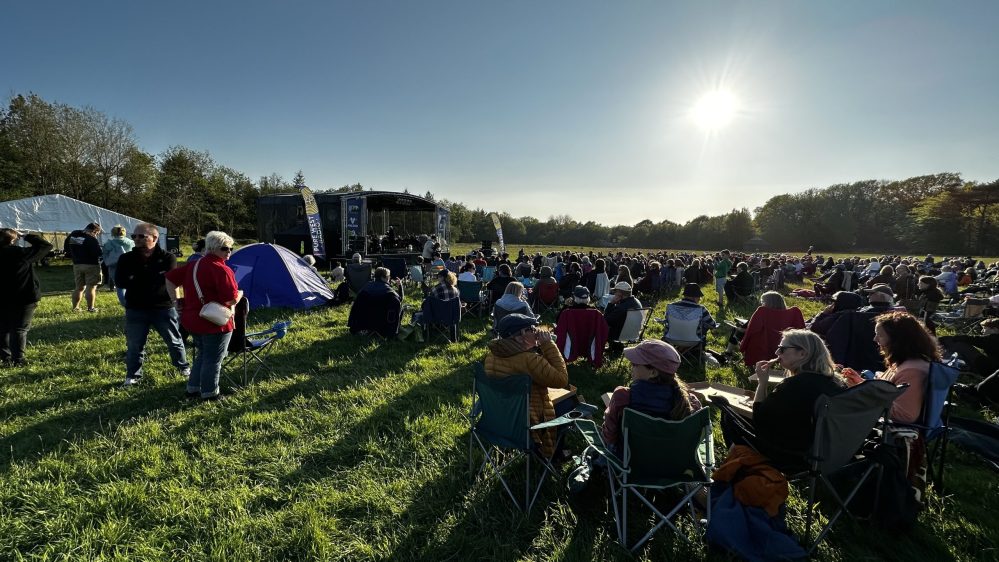
PEMBROKESHIRE MUSIC SERVICE is proud to announce the return of Music at the Manor on Friday 10th May at Scolton Manor for an evening of fantastic entertainment.
More than 150 Pembrokeshire young musicians will showcase their talents in the beautiful surroundings of Scolton.
This is the third Music at the Manor event, expanding on the success of previous years to bring an exciting evening of musical celebration from across Pembrokeshire.
Gates open at 4.30pm for a 6pm start and guests are invited to bring a chair or blanket and arrive in plenty of time to relax, soak up the atmosphere and grab something to eat.
Food lovers will be well catered for with Daps Baps, Pembs Pizza co and Worley’s Ice-creams on hand and Absolute Events Bars to provide a drink to enjoy along with the music.
Face painting by the talented Gabrielle Swales will also be on offer.
Performing are:
- Pembrokeshire Music Service (PMS) Youth String Orchestra
- PMS Youth Wind Band
- PMS Youth Brass Band
- PMS Rock and Pop bands “Nebular” and “Broken Strings”
- PMS Youth Woodwind ensemble
- PMS Training Orchestra featuring the Second Steps ensemble players
Cleddau Chamber orchestra and Pembrokeshire Music Service Community Choir will also perform.
Compere for the evening is Ysgol Greenhill Headteacher David Haynes.
Tickets are £8, £4 Concessions and £18 family ticket.
You can purchase tickets online or alternatively contact Angela White on 01437 775202.
Tickets will be available on the night but to reduce potential for congestion please pre pay where possible.

Charity
New Quay RNLI’s inshore lifeboat rescues stranded 26ft yacht
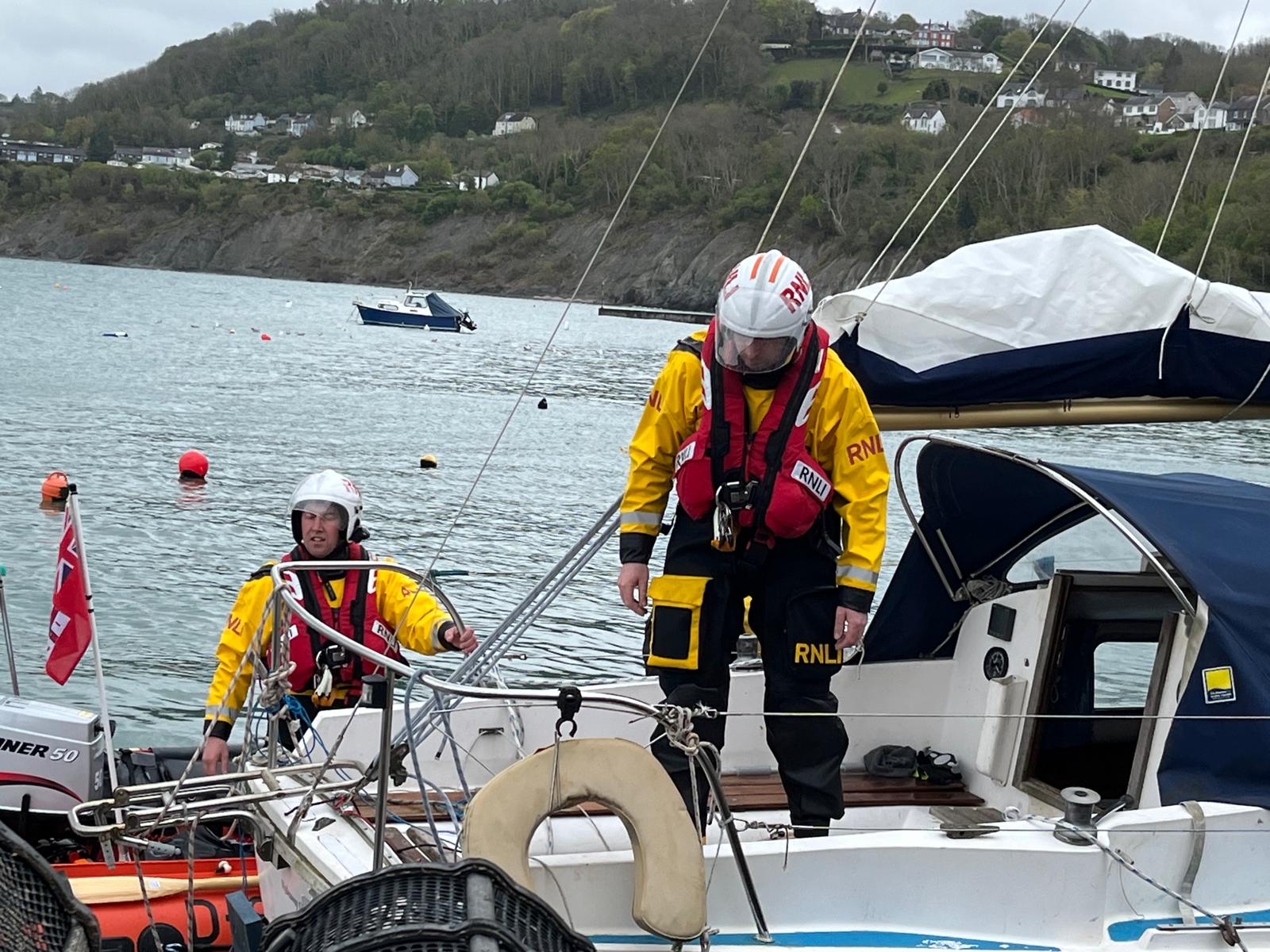
NEW QUAY RNLI’s inshore lifeboat was launched on service at 08:32 this morning to assist a 26ft yacht in difficulty a quarter of a mile from New Quay harbour.
Launching with four volunteer crew members, the D-class lifeboat, the Will Morgan, quickly located the vessel, with one person on board.
Simon Rigby, New Quay RNLI’s helm said, “The yacht had lost all means of propulsion, both sail and engine, and was unable to recover a fouled anchor.
“Having assessed the situation we decided that the best course of action was to take the vessel under tow to New Quay harbour. We placed two members of our crew on board, disconnected the anchor chain and began the tow.
“Having safely berthed the yacht alongside the harbour wall, we returned to station just after 09:30.”
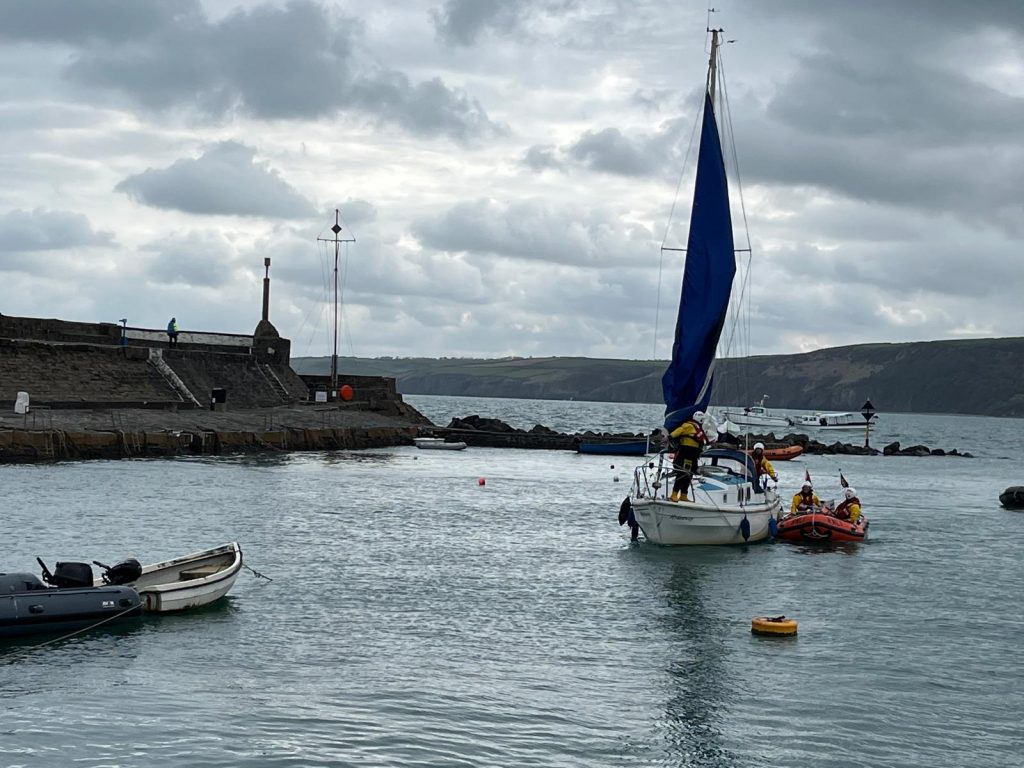
-

 News7 days ago
News7 days agoPolice issue update on the search for Luke, missing from Pembroke Dock
-

 News2 days ago
News2 days agoPolice and air ambulances at ‘serious incident’ at West Wales school
-

 News6 days ago
News6 days ago20mph U-turn: Some roads will return to 30mph following public outcry
-

 Community6 days ago
Community6 days agoMiracle pup finds her forever home after heart-wrenching journey
-

 Crime2 days ago
Crime2 days agoPembrokeshire pensioner accused of 17 sexual offences against children
-

 Crime1 day ago
Crime1 day agoAll three school stabbing victims discharged from hospital, police confirm
-

 Community3 days ago
Community3 days agoCounty Hall to offer space for community banking
-

 Crime4 days ago
Crime4 days agoBrian Davis: Wanted on suspicion of commercial burglary






















